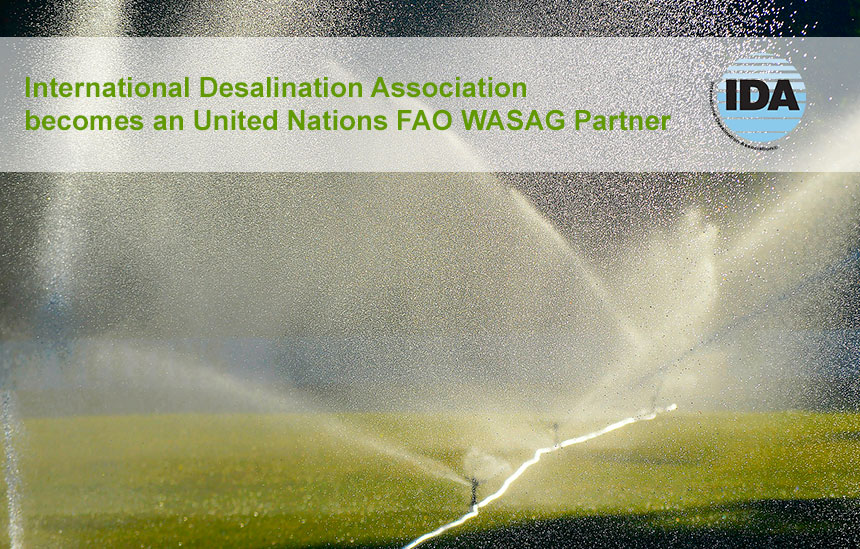INTERNATIONAL DESALINATION AND REUSE ASSOCIATION BECOMES A FAO WASAG PARTNER
BOSTON, January 25, 2018 – The International Desalination and Reuse Association (IDRA) has become a partner of the Food and Agriculture Organization of the United Nations (FAO) and its WASAG – The Global Framework on Water Scarcity in Agriculture – initiative.
“For many years, IDRA has been an NGO of the United Nations. Our partnership with FAO deepens our relationship and extends our reach into programs that can ultimately make a great difference in the future of the world. It also is another step forward in establishing relationships with leading organizations around the world that, like IDRA, are concerned with solving water scarcity problems,” said Shannon McCarthy, IDRA Secretary General.
FAO is a specialized agency of the United Nations that leads international efforts to defeat hunger. The WASAG Framework – launched by FAO and partners at the climate meeting in Marrakech in late 2016 – is designed to bring together key players across the globe and across sectors to tackle the collective challenge of using water better in agriculture to ensure food security for all. It is an initiative for partners from all fields and backgrounds to collaborate in supporting countries and stakeholders in their commitments and plans related to the 2030 Sustainable Development Agenda, the Paris Climate Agreement (including implementing nationally determined contributions) and other plans and programs related to agriculture and water.
Agriculture is the world’s largest user of water. According to FAO, water use expanded at over double the rate of population growth in the 20th century. By 2050, the world’s population is predicted to grow further by 2 billion to 9.3 billion. Combined with changing diets, says FAO, this means that the world will need to produce almost 50 per cent more food to meet demand. This will place greater stress on available water resources, which are expected to be further impacted by climate change.
IDRA sees desalination and water reuse as key tools to address this problem.
“Desalination provides the only sustainable new source of fresh water for the world’s growing population. It is now practiced in 150 countries, and we estimate that more than 300 million people around the world rely on desalinated water for some or all their daily needs. With water reuse programs, precious water resources can be recycled for drinking water, agriculture or industrial purposes, thus augmenting water supplies from other sources and conserving water resources,” said Ms, McCarthy.
With over 194 member states now part of the United Nations, FAO works in more than 130 countries worldwide. Including IDRA’s participation, FAO has established partnerships with 48 organizations globally. For more information, visit http://www.fao.org
About IDRA
The International Desalination and Reuse Association (www.idadesal.org) is a non-profit association that serves more than 2,600 core members in 60 countries and reaches an additional 4,000 affiliate members. Its membership comprises scientists, end-users, engineers, consultants and researchers from governments, corporations and academia. IDRA is associated with the United Nations as part of a growing international network of non-governmental organizations (NGOs).

